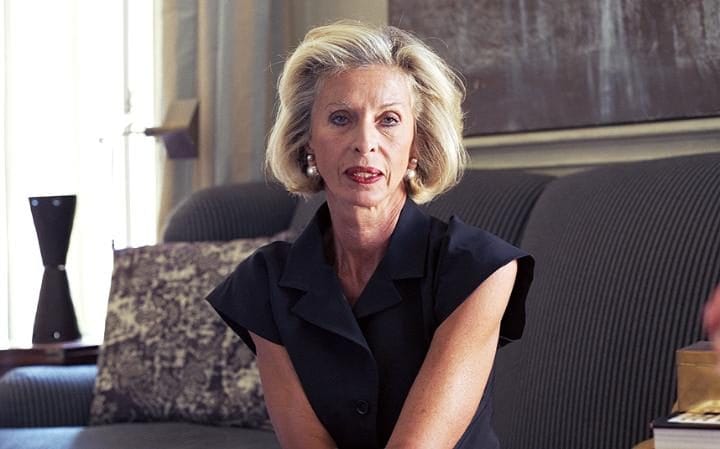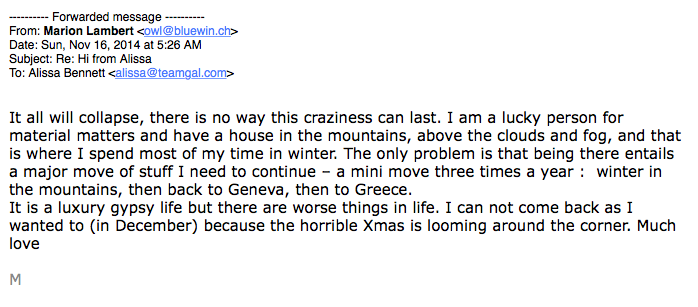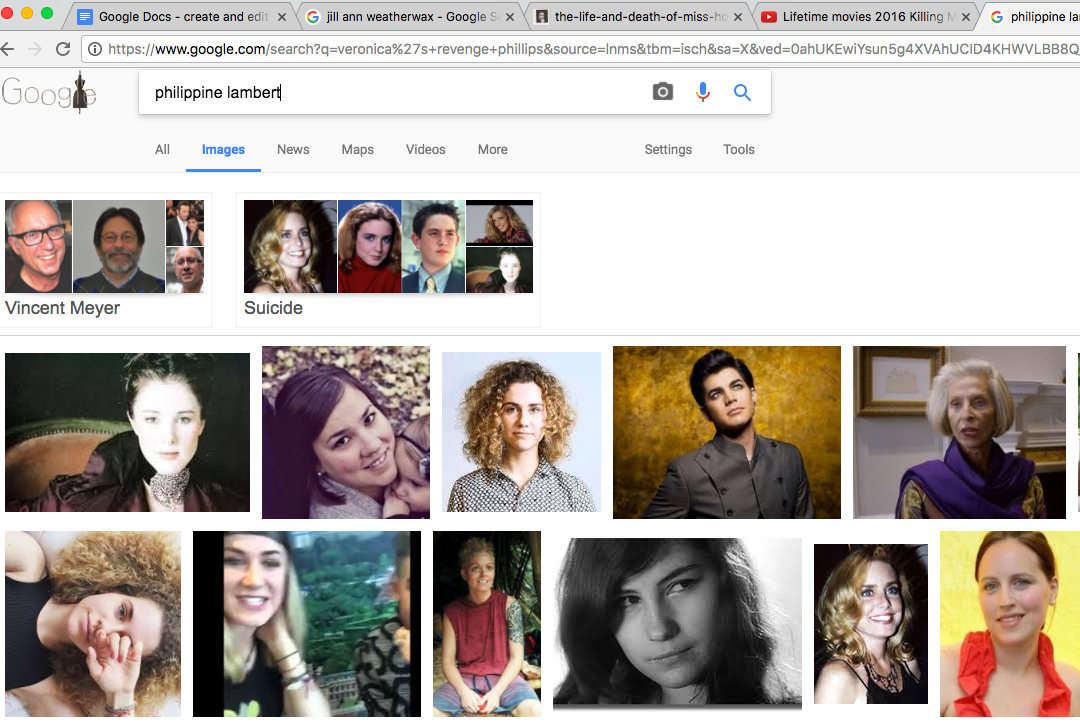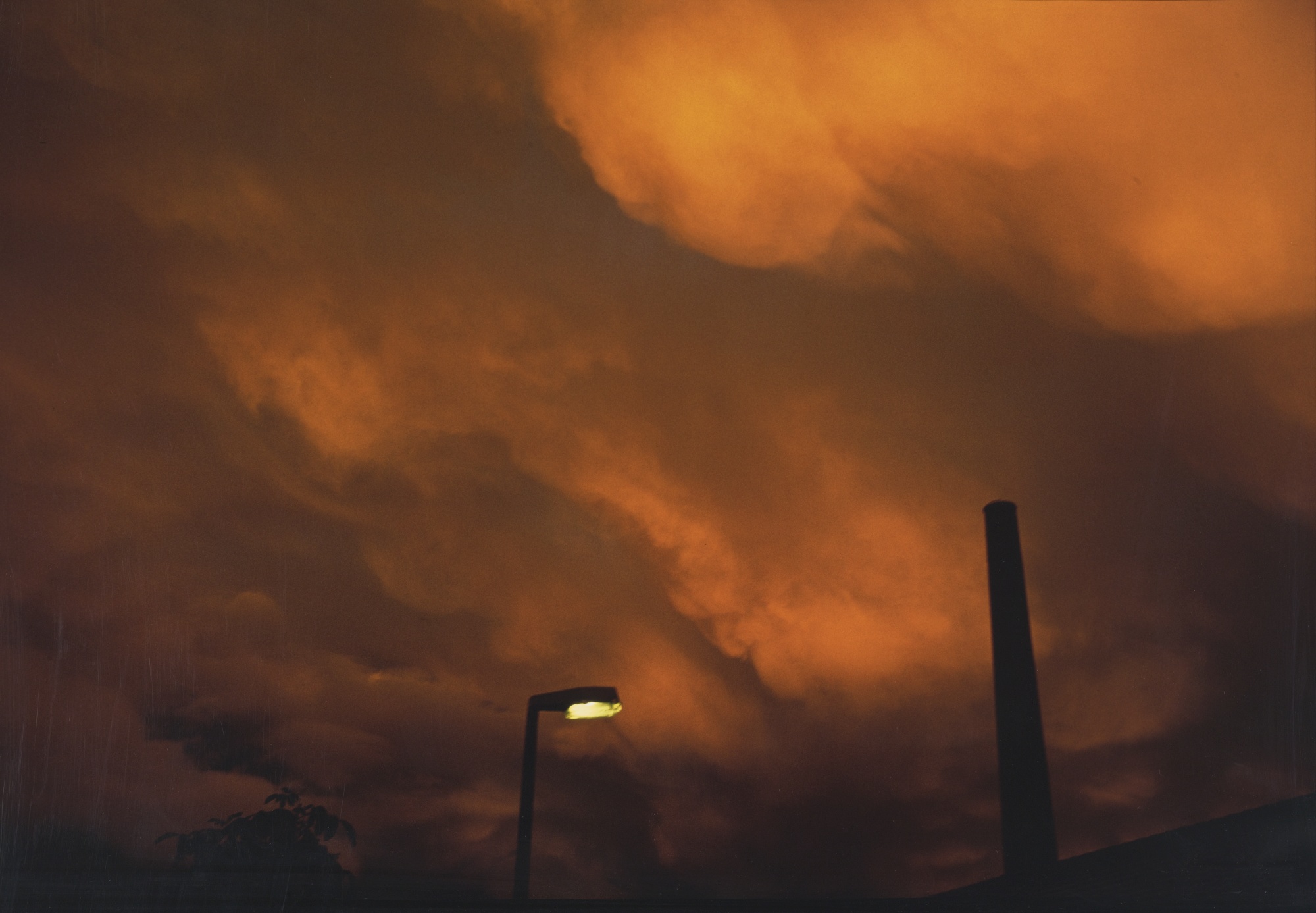Marion Lambert
Alissa Bennett
July 17, 2017

Baroness Marion Lambert… What can I say about you here that hasn’t already been said in private by people who were far more aware of the inner workings of your life than I could ever dream of being? Though we weren’t strangers, I was also never as close to you as I would have liked, and I can only surmise that it is this distance that keeps your ghost wandering the maudlin corridors of my heart.
It’s always hard for me to identify exactly what it is about a person that compels me toward them in death, and I suppose my usual conclusion is that examining the tragedies or addictions or heartaches of a stranger makes it easier to understand my own. Oh, sure I’m curious, Marion—I’m a voyeur and a creep and my most familiar impulse is the one that leads me to ransack the private details of other people’s lives, but this is different because I knew you.
Over the course of the last two years, I have written about overdosed celebrities, about assassinated pop stars and jilted lovers. I have written about drugs and murderous maids and depressed porn stars, about suicides that were both fast and slow. I have obsessively scoured the squalid corners of culture with the hope that it might help us all to understand our own heartaches, but I have never once felt compelled to write about a person who passed through my life. Despite the fact that it has more than its fair share of lurid scandal, I find the art world’s Everything Is Going Great veneer off-putting and dishonest, and does it sound ungrateful to admit that in general I’m just not interested?
I had always believed that I would never feel enough for someone I’d crossed paths with in my professional life to write about them, but let this short devotional text serve as proof that I was wrong. Your death last summer was a sad reminder that I would never know anything more about you, and there is little else I can do to reconcile my regret than to try my best to conjure for our readers the strange alchemy of your glamour and grief. What was it about you that made you different from every other secretly disappointed art collector crammed into a Christie’s evening sale? I am going to go out on a limb and say that no one who knew you at all wonders. Though I have pried enough to understand that your reputation as “difficult” far predates your daughter’s 1997 suicide, it is impossible to consider you outside of the context of this loss. Is openly addressing your trauma an art-world transgression? Maybe. Maybe I’m not supposed to write this because it breaches some implied contract, maybe I’m trespassing on condemned property… I’m not sure. I just think people should know.
In 2007, I was married to Banks Violette and was very excited when he secured a job for me working in an uptown gallery despite the fact that everyone involved understood that I was overwhelmingly unqualified. I was hopeful that maybe this new life meant that I didn’t have to be an underemployed loser forever, that maybe it could help me prove to him and the world that I wasn’t just an aging ex-fashion model with a flimsy liberal arts degree and an anxiety disorder. It didn’t take very long for me to understand that rescuing me from my shop girl duties at the Alexander McQueen boutique was really just his way of ensuring that I was financially equipped to take care of myself so that he could dump me without feeling bad (no hard feelings!)! I started working in the gallery in April—by May, my six-year marriage was over.
Oh, Marion, I suppose I did my best to hold myself together. I teetered around the townhouse in high heels and the ill-begotten designer clothes that I’d secretly charged to Banks’ credit cards, I tried my hardest to disguise my incompetence in the face of this unfamiliar culture of professionalism, I even pretended that I had the mathematical aptitude to learn QuickBooks, but there was nothing I could do to conceal the fact that I was slightly crazy from sadness and had no idea what I was doing.

I felt stupid and clumsy and disorganized, but the worst part was that I finally understood that it didn’t matter how I looked or who had once professed to love me because I was tacky on the inside. As one of the nice ladies I worked for once informed me, and the world, over the gallery intercom, Alissa Bennett KNEW NOTHING (no hard feelings!), and it didn’t make me feel any more confident when I had to acknowledge that she was RIGHT. The spring of 2007 ushered in the first of many soft crises, and not only did I feel contaminated by the failure of a marriage that I had been counting on to save me from ever having to accomplish anything myself, but I also suddenly understood that I’d been foolish to believe that a rich person could like me on my own now that I was without an art-star husband.
I am going to estimate that it was about two weeks into my new life as a dumped person that you and I first crossed paths. Oh, May is a heady time in the art world, isn’t it? All of the Very Important International People congress in New York for the Very Exciting Contemporary Auctions. There are dinners and galas and OUTFITS and everything is amazing and fancy and exciting and no one cares that they are tired or that they have to invite their mortal enemies over for tea because there is so much money to be made! Is it particular to the art world that there is a bizarre slippage between friendship and enmity? That it really doesn’t matter if someone has fucked your boyfriend or poisoned a deal because if they have something that you want, you will find a way to keep things civil (and even intimate)?
I’m sure that this is just the typical moral economy of business, Marion, but it does make for some interesting placement aerobatics at dinner parties. How is it that I ended up sitting next to you at one such gala? I can only imagine that it was thought that I would be charmed by your eccentric crabbiness and that you would be charmed that I was exactly the same age that your Philippine would have been had she not taken her own life. Whatever the reasoning behind the decision, it was a wise one. I loved you immediately.
What did we talk about at this dinner? The only concrete recollection I have is that I told you that your husband was handsome and you responded by pointing at him and intoning “Him? He used to be.” Oh you were glamorous (I remember navy satin and a set of diamond earrings), but you were also dismissive and withering and critical, and I was delighted to hear you complain at least once about every single person at the table. You said nothing cruel or debased or even gossipy, but you made certain that I was aware of what I was getting myself into, you made sure that I knew that you were fully cognizant of the murky social pools that your interest in both the buying and the selling of art forced you to wade through. I knew from this evening on that you weren’t totally happy, Marion, but I didn’t care because I wasn’t either.
How much do I fill in here? How much of everyone’s time do I take up by recounting the series of largely inconsequential interactions I had with you over the course of this particular auction week? Oh, it would just be vanity and this text, for once, isn’t really about me. I will just say that it was maybe a month later that an invitation came in the mail for the owners of the gallery inviting them to a charity event you were hosting in London. On the front of this invitation was a lenticular depicting a swing that had the perpetually disappearing figure of a child on it, and on the back was a photograph of a reclining teenage girl wearing Ray-Bans and maybe smiling. I remember asking what the invitation was for, if it needed to be entered into one of the itineraries that I could never manage to properly organize.

I was quickly informed that this charity gala was to raise funds for the National Society for the Prevention of Cruelty to Children and that the photograph on the back was of Philippine, your suicided daughter. Oh I don’t remember how much information I was given about this stranger’s death, but it was certainly enough to stir something in me. I was definitely told the basic details, that in 1997 your 20-year-old daughter had overdosed on sleeping pills in Capri, that she’d left a diary and a note stating that her unhappy adolescence and young adulthood traced a direct line back to a close family friend who had raped her repeatedly from her 12th year to her 15th. “It happened in Capri, in Crete, in Geneva, in Aix-en-Provence, in Sicily,” I would later understand she’d written to you. “I want him to pay 40 million Swiss francs and go to jail for the rest of his life.” I felt alarmed to suddenly realize that people live through traumas so profound and somehow manage to continue, and I knew right away that if I was to understand anything about you, I needed to understand this first.
The internet was a different place in 2007; in terms of archived news, it was threadbare and dissatisfying and incomplete, and my initial searches into the details of Philippine’s death produced very little. There were two or three old articles that I read repeatedly, there was an image of a Philippine Lambert rose that I found myself continuously clicking on despite the fact that experience told me time and again that it wouldn’t bring me anywhere I hadn’t already been. I found a copy of the catalogue for the 2004 sale of your photographs at Phillips and looked at it until the pages started to detach from the spine.
I remember reading the short text you’d written about the reasons why you’d decided to part with what I think was surely one of the best collections of contemporary photography ever assembled by a private individual. “My daughter’s untimely death, as a result of the devious and criminal acts of a perverse individual (unpunished because of the statute of limitations, but not acquitted) left this collection without a future.” Despite the fact that the bulk of your introduction is an elegant and articulate treatise about what it means to be the temporary guardian of a work of art that is destined to outlive its stewards, it was always the line about the future that lingered with me. These words are swollen with unmitigated loss and disappointment, and I find it impossible to separate them from my impression of you.
Over the years I was able to learn about the story in greater detail; it is sordid and bitter, it is painful and pained, and although I always thought of your disappeared daughter whenever I saw you, I knew better than to think ours was an intimacy that could accommodate the subject of her. I would sometimes send you pieces of my writing and hope that I was somehow telling you that I understood perfectly how awful it feels to be left.
The last time I saw you was in November of 2013 at an opening. I was leaving the uptown job that I’d never quite figured out how to be good at, and the evening was fraught and awkward for me, mostly because I didn’t want to be there. I couldn’t wait to get away from the litany of inept decisions that I knew I would never be able to live down, and I was painfully aware that I had outlived my usefulness to two women who obviously resented my inability to be more self-contained or discreet or administratively focused. Nothing felt genuine to me at that moment, Marion, and it is perhaps because of this that I was so glad when I saw you. Your used-to-be handsome husband had died by this point, and though I felt some new kind of empathy for you, I would never have called it pity—just a slightly exaggerated expression of the sad tenderness that I’d always felt.
“You look beautiful,” I told you, and you touched the shoulder of your sweater and said “This? It’s Lanvin. It’s very cheaply made.” In that moment you were so perfectly you, Marion. We complained together about the art world, about what money meant and didn’t mean, about how we mutually hoped the whole thing would collapse so that there could at least be the possibility of a reconfiguration that would rescue art from the jaws of irreversible corruption. I told you that I was leaving my job and promised to keep in touch, and I let you know how much I’d always loved seeing you.
And then what, Marion? Oh we would email one another every few months, I would find myself thinking of you and tell you so. The pleasantries were basic, but I always knew that my messages to you would be responded to as though they held at least the specter of personal import.
I was shocked last year to learn that you’d been hit by a bus in London and had died shortly after. It was sad and indecent and perverse and there wasn’t enough information to sate my obsessive inquiry into what, exactly, had happened to you. I sent two emails on the day that I found out you were gone: one to my old boss, and one to you. Both of these notes expressed my deep sadness regarding your loss, and perhaps unsurprisingly, both went unanswered.
I tried to quiet my curiosity with my customary news binge and felt surprised by how much information had surfaced in the intervening years between our meeting and your death. There are now pages of articles detailing your heartache, a new group of texts written by people who cared for and respected you, and even a handful of photographs of Philippine. Is it enough to make me feel like I can really see either of you? And could there ever be enough to actually satisfy me? Probably not.

When I first imagined writing this text about you, I thought that I would compile a chronology detailing the lengths you went to ensure that there would be legal consequences for the man your daughter said had “polluted her life.” I imagined offering this text as a comprehensive place to store all of the information I have salvaged, all of the graphic speculation, your statements about having been castigated from society for refusing to be silent, the gestures you resorted to when your daughter’s accused rapist was eventually released from prison following the court’s finding that the statute of limitations had expired. In the end, though, an abbreviated scandal biography is not what I want to write about you, and all of that information is as available to anyone who reads this as it was to me. Should the story interest anyone, they now know exactly how to find it.
Over the past month, I have conducted my research as I generally do. I have tried to contact strangers and have often been rebuffed, I’ve asked people who knew Philippine to tell me what they remember about her, I have looked for photographs of all of you, traced family trees back so far that the information is rendered meaningless. It is maybe telling that I am not so far removed from the bungling uptown gallery worker who absentmindedly mailed checks to the wrong addresses or inadvertently caused people from the same company to bid against one another at auctions—I discovered last night when looking in my outbox that I had accidentally emailed some poor stranger named Paul the same call for information 17 times; I can understand exactly why he didn’t answer me.
Oh I understand that the story is a complicated one and I understand why ranks close down when an outsider knocks on the door— it’s none of our business what you have suffered together, regardless of how badly we want to know. There is a photograph that Nan Goldin took that maybe sums it up best—it is an image of a streetlight and a smokestack silhouetted in front of a evening sky that is full of supernaturally orange cumulous clouds. Its title is simple and to the point: The sky on the twilight of Philippine’s suicide. The words are terrible beyond comprehension.
I’m told that your memorial in Geneva was quiet, that its attendance in no way resembled those crowded May dinner parties that I will forever associate you with. People had lives to live, art to sell, auctions to attend, and I suppose that there is maybe some truth in what I have been told by people who knew you far better than I—that your intensity had simply exhausted your friends so deeply that they weren’t even sure how to say goodbye to you.
I have no doubt that you were complicated, Marion, that you left people fatigued and that your negativity bummed people out, and part of what I liked about you was your incredible ambivalence about having to navigate the social elements of The Art World in order to actually get art. It was fun to complain with you, to once or twice a year check in with each other and confirm that we still weren’t having any fun. I still think of you and check the internet for news once in a while. It doesn’t really matter to me that I’ve read it all already.